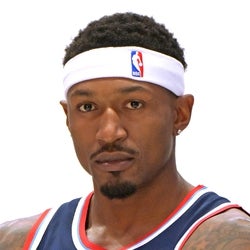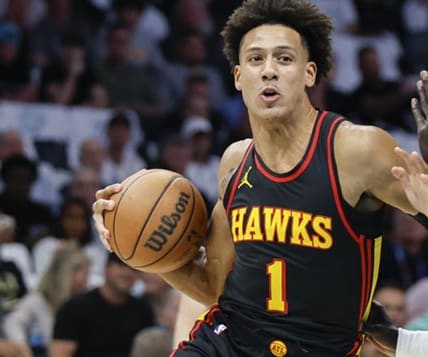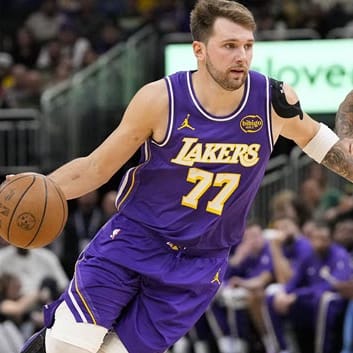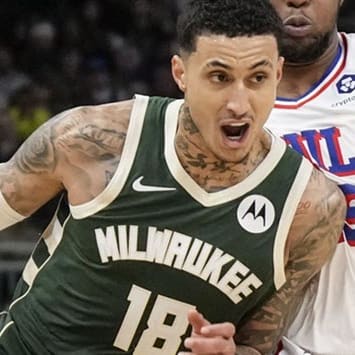OFS
Injury Hip
Est. Return 10/1/2026
2025 Stats
PTS
8.2
REB
0.8
AST
1.7
STL
0.5
BLK
0.0
ROS Projections
2025 Fantasy Outlook
Beal's time in Phoenix, a period during which the organization spent about half its effort trying to unload his massive contract, has come to an end. He was bought out by the franchise this summer, signing a two-year deal with the Clippers (with a player option for Year 2). For as much negative press as Beal has gotten lately, he was still a highly-efficient offensive piece last year, averaging 17.0 points and 1.9 threes on 50/39/80 shooting with 3.7 assists, 3.3 rebounds and 1.1 steals in 32.1 minutes. That's not to say he's as great as he once was, or that his game isn't changing. Beal is handling the ball less than ever before, and he's taking more catch-and-shoot threes, especially from the corner, than he ever has before. Baked into any discussion about Beal is his injury history. The 32-year-old hasn't played 60 games since 2020-21, and the last time he played more than 60 games was 2018-19. With the Clippers, he also has plenty of competition for usage. James Harden and Kawhi Leonard run the show, while Chris Paul and Ivica Zubac will get their fair share of touches. But the team is deep in general, also employing Kris Dunn, Bogdan Bogdanovic, Derrick Jones, John Collins, Nicolas Batum and Brook Lopez. As one of the oldest teams ever assembled, there will be rest days and injuries galore, so Beal will get his chances to operate as a lead guard. But plenty of those injuries and rest days will be his, too. Ultimately, this situation doesn't project any better than his time in Phoenix from a fantasy perspective. He's fine for a pick outside of the top 100 just for the good days, but anything sooner than that is taking on significant risk. Read Past Outlooks

Slated for season-ending surgery
Beal was diagnosed Wednesday with a left hip fracture and will require season-ending surgery, Shams Charania of ESPN reports.
ANALYSIS
Beal had previously exited Saturday's 114-103 loss to the Suns and sat out Monday's 105-102 loss to the Hawks to an injury the Clippers initially referred to as hip soreness. However, following further imaging, Beal was diagnosed with a fracture, and after consulting with multiple specialists, a unanimous decision was reached for the three-time All-Star to have season-ending surgery. After being bought out from his contract with Phoenix over the summer, Beal joined the Clippers on a two-year, $11 million deal in July. The second season of his deal is a $5.6 million player option, which he may be inclined to pick up after sustaining a long-term injury. With Beal out for the season, the Clippers could continue to lean more heavily on Kris Dunn alongside James Harden in the backcourt. Beal's absence could also pave the way for either or both of Bogdan Bogdanovic and Chris Paul to re-enter the rotation after both went unused in the Clippers' previous two contests.
Beal had previously exited Saturday's 114-103 loss to the Suns and sat out Monday's 105-102 loss to the Hawks to an injury the Clippers initially referred to as hip soreness. However, following further imaging, Beal was diagnosed with a fracture, and after consulting with multiple specialists, a unanimous decision was reached for the three-time All-Star to have season-ending surgery. After being bought out from his contract with Phoenix over the summer, Beal joined the Clippers on a two-year, $11 million deal in July. The second season of his deal is a $5.6 million player option, which he may be inclined to pick up after sustaining a long-term injury. With Beal out for the season, the Clippers could continue to lean more heavily on Kris Dunn alongside James Harden in the backcourt. Beal's absence could also pave the way for either or both of Bogdan Bogdanovic and Chris Paul to re-enter the rotation after both went unused in the Clippers' previous two contests.
NBA Per Game Stats
Per Game
Total
Per 36
NBA Per Game Stats
Loading Per Game Stats...
2025 NBA Game Log
2025
2024
2023
2022
2021
2020
2019
2018
2017
2016
2025 NBA Per Game Split Stats
Schedule
By Month
Starting/Off Bench
Days Rest
Vs Opp
By Result
2025 NBA Per Game Split Stats
Loading Split Stats...
Advanced Stats
Loading Advanced Stats...
Stat Review
2025
2024
2023
2022
2021
2020
2019
2018
2017
2016
How does Bradley Beal compare to other players?
This section compares his stats with all players from the previous three seasons (minimum 200 minutes played)*. The bar represents the player's percentile rank. For example, if the bar is halfway across, then the player falls into the 50th percentile for that stat and it would be considered average.
True Shooting %
47.6%
Effective Field Goal %
44.8%
3-Point Attempt Rate
39.6%
Free Throw Rate
16.7%
Offensive Rebound %
2.0%
Defensive Rebound %
2.8%
Total Rebound %
2.4%
Assist %
12.4%
Steal %
1.1%
Block %
0.0%
Turnover %
12.7%
Usage %
22.2%
Fantasy Points Per Game
11.7
Fantasy Points Per Minute
0.6
NBA Historical Fantasy Stats
Historical ADP
Loading Historical ADP...
Clippers Depth Chart
Our full team depth charts are reserved for RotoWire subscribers.
Subscribe Now
Clippers Rotation: Minutes Breakdown
Loading Clippers Rotation Data...
Average Fantasy Points
Minutes
FanDuel
DraftKings
Yahoo
FantasyDraft
Head2Head
Sorare
Average Fantasy Points are determined when Bradley Beal was active vs. non-active during the season. Click here to view average fantasy points for a different time period.
Loading Average Minutes...
Past Fantasy Outlooks
2024
2023
2022
2021
2020
2019
2018
2017
2016
2015
2014
2013
2012
Beal's first full season in Phoenix yielded modest production, clouded by an all too familiar case of missed games. He simply can't stay healthy at this point, having played no more than 60 games in each of the past five seasons. As if that wasn't enough to deter managers, he is now the clear third option on offense, behind both Kevin Durant and Devin Booker. Beal closed the season averaging 18.2 points per game, the fewest he has averaged since the 2015-16 season. He added 4.4 rounds, 5.0 assists, 1.0 steals and 1.9 three-pointers, good enough for top-75 value in standard leagues. On a positive note, he did manage to shoot better than 50 percent from the field for the second time in his career, making him a positive contributor in that category. Coming into the 2024-25 season, Beal appears as though he will play a very similar role once again. The addition of Tyus Jones could result in a small hit to Beal's assist numbers, something to consider when drafting him. Given the recent slew of missed games and declining role, Beal does not need to be drafted before the sixth round.
More Fantasy News

Ruled out for Wednesday
Beal (hip) has been ruled out for Wednesday's game against the Nuggets, Joey Linn of SI.com reports.
ANALYSIS
Subscribe now to instantly reveal our take on this news.
Subscribe now to instantly reveal our take on this news.

Won't go vs. Hawks
Beal (hip) is out for Monday's game against Atlanta, Mark Medina of TheSportingTribune.com reports.
ANALYSIS
Subscribe now to instantly reveal our take on this news.
Subscribe now to instantly reveal our take on this news.

Iffy for Monday
Beal is questionable for Monday's game against the Hawks due to left hip soreness, Tomer Azarly of ClutchPoints.com reports.
ANALYSIS
Subscribe now to instantly reveal our take on this news.
Subscribe now to instantly reveal our take on this news.

Returns Saturday
Beal (hip) returned to Saturday's game against the Suns at the start of the second half, per the broadcast.
ANALYSIS
Subscribe now to instantly reveal our take on this news.
Subscribe now to instantly reveal our take on this news.

Questionable to return Saturday
Beal (hip) is questionable to return to Saturday's game against the Suns, independent NBA writer Justin Russo reports.
ANALYSIS
Subscribe now to instantly reveal our take on this news.
Subscribe now to instantly reveal our take on this news.
Latest Fantasy Rumors

Injuries not related
Clippers president of basketball operations Lawrence Frank said Wednesday that Beal's season-ending hip fracture isn't related to any other injury he's experienced, Mark Medina of TheSportingTribune.com reports.
ANALYSIS
"He did everything he was asked," Frank said. "He's a high character guy. I feel horrible that he's dealing with this." Frank added that doctors are "extremely optimistic he'll make a full recovery" and that the time off will help him get over lingering "knee inflammation." Beal holds a $5.6 million player option for the 2026-27 season, and while it's still early, it seems likely that he's going to pick it up given his injury history.
"He did everything he was asked," Frank said. "He's a high character guy. I feel horrible that he's dealing with this." Frank added that doctors are "extremely optimistic he'll make a full recovery" and that the time off will help him get over lingering "knee inflammation." Beal holds a $5.6 million player option for the 2026-27 season, and while it's still early, it seems likely that he's going to pick it up given his injury history.















